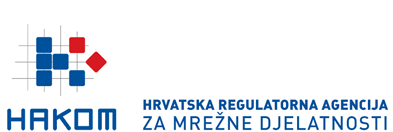HAKOM at the bilateral meeting with Slovenia on the coordination of 146-174 MHz and 410-430 MHz frequency bands and cooperation in the field of 5G technologies
NEWS
At a bilateral meeting held in Ljubljana HAKOM negotiated the frequency registers for the 146-174 MHz band and the proposal for an agreement on the 410-430 MHz band. This will facilitate the international coordination of frequencies for private mobile communications networks. The meeting also included a discussion on possible cooperation in the field of 5G technologies.
Zagreb, 9 December 2016 – A bilateral meeting between representatives of the Slovenian agency for communications networks and technologies (Agencija za komunikacijska omrežja in storitve Slovenije, AKOS) and the Croatian Regulatory Authority for Network Industries (HAKOM) concerning the use of the 146-174 MHz and 410-430 MHz bands was held in Ljubljana. Both countries are signatories of the HCM (Harmonised Calculation Method) agreement which lays down the rules for the coordination of frequencies and radio stations between neighbouring countries used in the operation of mobile and fixed electronic communications networks. The allocation of frequencies between two countries is agreed at a bilateral level.
In April of 2015 HAKOM signed the Agreement on the frequency coordination in the frequency bands between 29.7 MHz and 470 MHz with Slovenia, which also covers the 146-174 MHz band. This meeting was organized because Slovenia voiced the need for the revision of frequency registers in that band. Following an additional analysis of requests, a bilateral agreement will be signed in early 2017. Further cooperation will include the coordination of frequency registers in other frequency bands intended for private mobile networks (PRM - closed type networks - firefighters, energy supply, taxi services etc.). Furthermore, the possible signature of an agreement for the coordination of the 410-430 MHz band, which would include other neighbouring countries as well, was also discussed. The resolution of these issues will result in a clear definition of international rights of individual frequencies, which significantly facilitates further planning of private mobile networks and enables more efficient use and simpler planning of the spectrum in those frequency bands.
The cooperation in the area of 5G technologies is also envisaged in the future in order to enable the use of the most advanced technologies in geographically restricted areas as soon as possible. HAKOM was represented at the meeting by the head of the Radiocommunications Committee, Mrs. Ivančica Sakal, a senior expert on microwave and satellite links, Mr. Vladimir Duković and an expert on private networks, Mr. Alen Štefanac.
# # #
For additional information please contact:
Croatian Regulatory Authority for Network Industries (HAKOM)
Roberta Frangeša Mihanovića 9
10110 Zagreb, Croatia
Tel. + 385 (0) 1 700 70 07
Fax + 385 (0)1 700 70 70
Media inquiries can be submitted online using HAKOM’s official website:
Registration required.
ABOUT HAKOM: HAKOM (www.hakom.hr) - Croatian Regulatory Authority for Network Industries – ensures preconditions for a fair market competition, stable growth and environment for innovations in the electronic communications and postal services market. HAKOM protects users’ interests and the possibility of choice among various communications and postal services at affordable prices, defines sustainable competitive conditions for operators and service providers under fair conditions for return on investment, and provides support to economic growth, public services and the quality of life in the Republic of Croatia by using modern technologies. HAKOM’ strategic goals are: to promote regulation of the electronic communications and postal services market, to support growth of investments and innovations in the electronic communications and postal services market, to provide efficient use of limited resources, to accelerate the growth of broadband products and services, to provide affordable offers of communications and postal services, to provide protection and informing of users, to build an efficient and comprehensive information system, to define and implement efficient processes, and to acquire multi-disciplinary competencies in market regulation.
|

